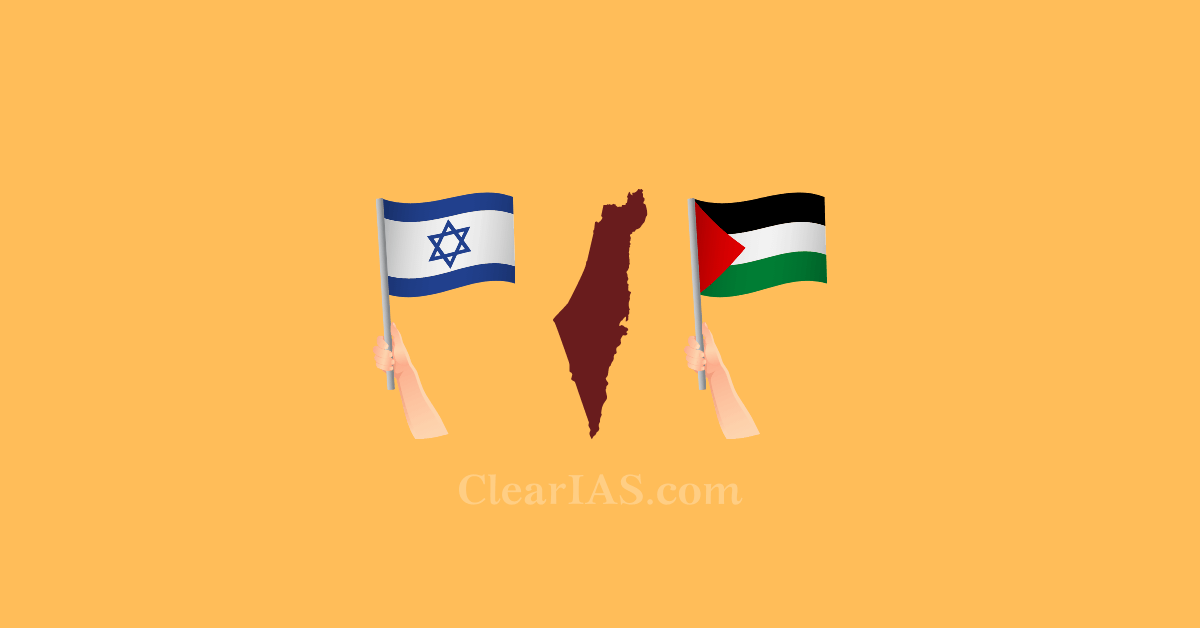
Know everything you need to know about the Israel-Palestine Conflict – History, Wars, and Solution.
We have been receiving many requests from our readers to create an easy-to-understand article covering all the issues related to Israel-Palestine. Though it’s not easy to cover every dimension within a limited space, in this post, we have tried our best to create a comprehensive article on the Israel-Palestine conflict.
The Israel-Palestine conflict – often referred to as the ‘world’s most intractable conflict’ – is rooted in a dispute over land claimed by Jews as their biblical birthright and by the Palestinians, who seek self-determination. Despite repeated attempts to end the conflict between the two countries, there is no peace settlement in sight.
The History of Israel-Palestine Conflict
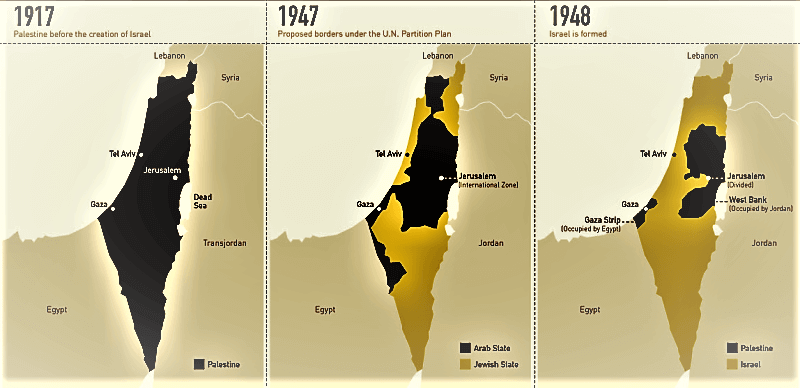
- Jews have been persecuted throughout history due to their religious beliefs and foreign culture.
- In 1897, Jews started a movement called a Zionist movement, to escape persecution and establish their own state in their ancestral homeland, Israel. The World Zionist Organisation was created to advocate for the establishment of a Jewish homeland in Palestine.
- As a result, a large number of Jews started flowing into Palestine and they bought land and started settling down there.
- By 1916, Palestine came under British control after the Sykes-Picot Agreement (a secret agreement between Great Britain and France). This led to the division of the old Ottoman Turkish Empire.
- Later through the Balfour Declaration, the British foreign secretary James Balfour agreed to the establishment of a Jewish homeland.
- After the Nazis gained power in Germany in the 1930s, the Jews influx to Palestine took a major turn with hundreds of thousands of them resettled from Europe to Palestine. Arabs saw this as a threat to their homeland and they fought bitterly with them. As the British Government remained as a mute spectator, violence reached its peak.
- In 1947, the British Government referred the question of the future of Palestine to the United Nations. UN voted to split the land into two countries. Jewish people accepted the agreement and declared the independence of Israel.
Arab’s fight against the Israel (1948-49)
- Arabs saw the creation of Israel as a part of a conspiracy to move them out of their land. Consequently, in 1948, the Arab states of Egypt, Jordan, Iraq, and Syria declared war on Israel.
- Note: It’s interesting to note here that India opposed the UN resolution and Gandhi called it as a crime against humanity. But India recognized Israel in 1950.
- At the end of the war between Israel and Arab countries, Israel emerged victoriously. Moreover, it could increase its territory to a larger extent and it marked the beginning of the expansionist policy of Israel.
- As a consequence of the war, a large number of Palestinians either flee or were forced to move out of Israel and settle in refugee camps near Israel’s border. It was the beginning of Palestine refugee crisis which ultimately led to the creation of a terrorist organization PLO (Palestine Liberation Organization) in 1964.
Israel’s fight against the Arab countries (1967)
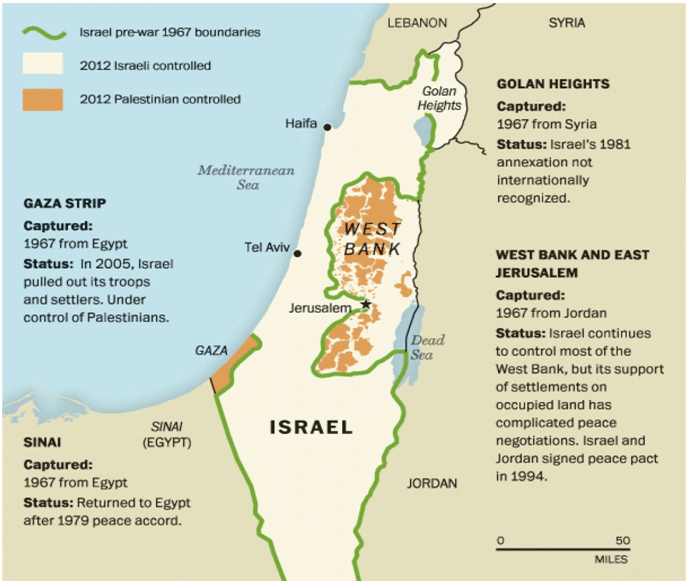
- Golan Heights from Syria.
- West Bank and East Jerusalem from Jordan.
- Sinai Peninsula and Gaza Strip from Egypt. (Refer to the map above)
- The 1967 war is particularly important for today’s conflict, as it left Israel in control of the West Bank and Gaza Strip, two territories home to a large number of Palestinians.
- Gaza and Westbank are together known as ‘Occupied Territories’, after the 1967 war.
UN Charter and return of the Sinai Peninsula
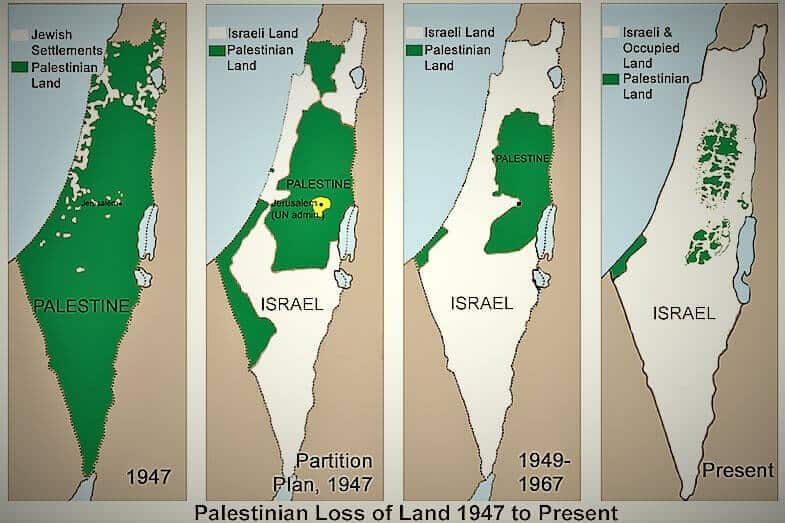
- Under the UN Charter, there can lawfully be no territorial gains from war, even by a state acting in self-defense.
- Therefore, in response to the Six-Day War, the UN Security Council adopted a resolution for ‘Land for peace’ and it mandated that Israel should return the captured areas back to the defeated nations.
- In light of Israel’s reluctance to return the captured territories, another Arab-Israeli war erupted in 1973 (Yom Kippur War) in which Israel suffered some setbacks.
- In 1979, Israel-Egypt signed a peace treaty, accordingly, Israel returned the Sinai Peninsula to Egypt (1982). Egypt became the first Arab nation to officially recognize Israel as a state.
Also read: Arab Nationalism
Hamas and Fatah
- In 1987, Hamas (Islamic Militant group) for the liberation of Palestine through Jihad came into existence. It refused to recognize Israel as a country. It has received support from Iran and Syria.
- On the other hand, Fatah, a faction of PLO under Yasser Arafat received support from Western nations.
Intifada (uprising) against Israel occupancy
- First Intifada: The tension between Israel and Palestine escalated with Israel’s increased settlement in the West Bank and Gaza Strip. Palestinians living in the West Bank and the Gaza Strip fomented the riots begun in 1987, known as the first intifada.
- Oslo Peace Accord: With the mediation of US and Russia in 1993, Israel and PLO signed the Oslo Peace accord which was based on the concept of two-state solution. Palestine and Israel signed the Declaration of Principles – in which both nations seek recognition as autonomous governing bodies. PLO recognized Isreal. Isreal agreed to give independence to the ‘occupied territories. However, territories remained under Israel possession.
- Camp David Summit (2000): It aimed to help the two sides finally agree on a settlement, but the talks eventually failed. The violence led to the Second Intifada.
- Second Intifada (2000-05): In 2000, a more violent Palestine Uprising started and a large number of civilians died on both sides. This is known as the second intifada. As a defensive measure, Israel constructed a West Bank Barrier along West Bank to separate Israel and Palestine settlements.
- Gaza Expulsion plan: This is a unilateral disarmament plan by Israel by which Israel’s defence forces leave the Gaza strip and four settlements in the northern West Bank (2005)
Tensions between Hamas and Fatah
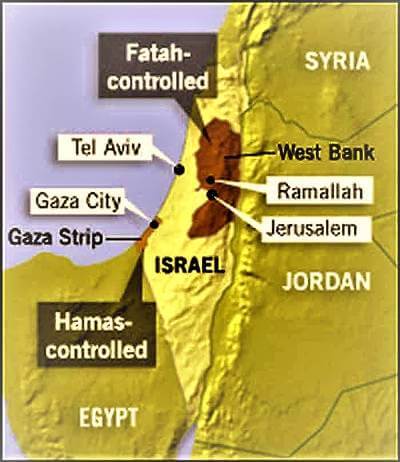
- After the Oslo accord, a Palestinian Authority (PA) was created with a limited self-rule power in the occupied territories.
- But this led to disputes between Hamas and Fatah for political power.
- Hamas – do not accept the Oslo peace accord or 2 state peace resolution. They want the whole state. They control Gaza. Hamas is supported by Iran.
- Fatah – accept the Oslo peace accord and negotiates for peace. They control West Bank.
- In 2006, Hamas won the Palestine election and it intensified the tensions between Fatah and Hamas for power. After a long-armed struggle, in 2011 Palestinian Rivals Fatah and Hamas signed a Reconciliation Pact.
- Currently, Gaza is controlled by Hamas and Palestine West bank region by Fatah with known presence of Israeli settlements.
- Operation Protective Edge: By Israel to punish Hamas for abducting and killing Israeli settlers.
Israel-Palestine conflict and US
- The US has been playing a significant role as the mediator in the Israel-Palestine. However, its credibility as a mediator had long been questioned by Palestinians. The United States has been criticized by the OIC (Organization of Islamic cooperation) and other Arab organizations, for vetoing most Security Council decisions critical of Israel.
- Note: The USA has more Jews than Israel. Jews have significant control over US media and the economy.
- Also, Israel receives about $3 billion in direct foreign assistance each year, which is roughly one-fifth of America’s entire foreign aid budget.
- On the other side, United States has been vocal about its intention to veto any Palestinian bid for statehood. Due to which Palestine had to be satisfied with a ‘non-member observer status in UN.
- However, the second term of the Obama administration saw a degrading US-Israel relationship. Iran Nuclear deal of 2015 irritated Israel and it criticized the US for the deal.
- Obama administration allowed the United Nations to pass a resolution that declared Israel’s growing settlements in the occupied territories illegal. Until that vote, the Obama administration had blocked resolutions criticizing Israel by using its veto power in the UN Security Council.
- With the presidency regime under Trump, who was more inclined to Israel, the illegal settlements by Israel in West Bank and Gaza saw a rise.
What does Palestine want?
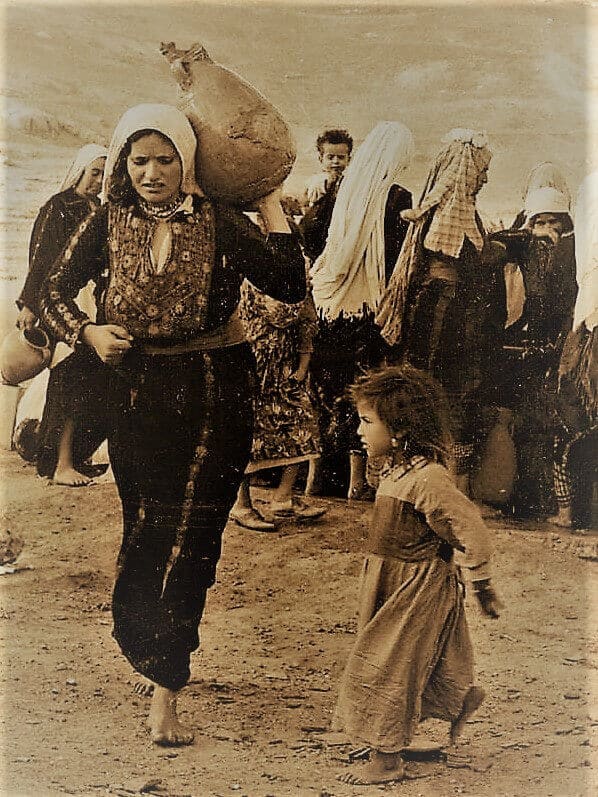
- They want Israeli to withdraw from pre-1967 borders and establish an independent Palestine state in West Bank and Gaza.
- Israel should stop all expansion of settlements before coming to peace talks.
- Palestine wants Palestine refugees who lost their homes in 1948 to be able to come back.
- Palestine wants East Jerusalem as the capital of the Independent Palestine state.
What does Israel want?
- Sovereignty over Jerusalem.
- Recognition of Israel as a Jewish State. Note: Israel is the only country in the world created for a religious community.
- The right of return of Palestine refugees only to Palestine and not to Israel.
What is so special about Jerusalem?
Jerusalem is a city that straddles the border between Israel and the West Bank. It’s home to some of the holiest sites in both Judaism and Islam, and so both Israel and Palestine want to make it their cap the solution to the Israel-Palestine conflict.
The solution for the Israel-Palestine conflict
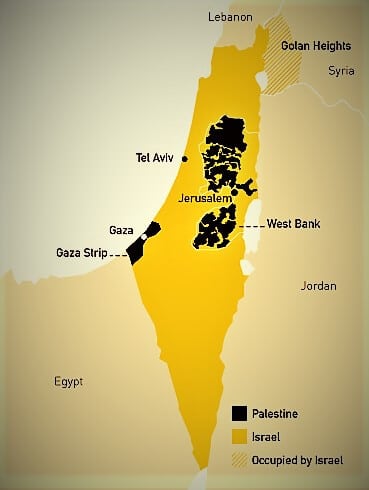
- The best solution is a “two-state solution” that would establish Palestine as an independent state in Gaza and most of the West Bank, leaving the rest of the land to Israel. Though the two-state plan is clear in theory, the two sides are still deeply divided over how to make it work in practice.
- One state solution (only Palestine or only Israel) is not a viable option.
- Road Map for Peace: The European Union, UN, US, and Russia had released a road map in 2003, which outlined a clear timetable towards a Palestinian state.
- The democratization of the Palestinian society through which new credible leadership can emerge is necessary.
- The need of the hour is to treat this conflict as an Israeli-Arab conflict rather Israel-Palestine. As we have seen, conflict is not only between Israel and Palestine but also with other Arab countries such as Egypt, Jordan, Iran, Syria etc. All of them should participate in the negotiations and the final agreement should be recognized formally by each one of them along with UN general assembly and security council.
- It is time for the international community to find a just and lasting peaceful solution to the World’s most intractable conflict soon.
Israel-Hamas ceasefire 2025
On January 19, 2025, Israel and Hamas implemented a ceasefire agreement aimed at halting the 15-month-long conflict that resulted in significant casualties and destruction in Gaza. The ceasefire facilitated the exchange of hostages and prisoners: Hamas released three Israeli hostages, while Israel freed 90 Palestinian prisoners.
- Following the ceasefire, hundreds of aid trucks carrying food and fuel entered the Gaza Strip through Israel and Egypt, providing much-needed relief to the affected population.
- Despite the ceasefire, tensions persist in the region. Israeli forces have continued operations in areas such as Jenin in the West Bank, leading to further casualties and displacement of residents.
- The ceasefire’s sustainability remains uncertain, with concerns about its fragility and the potential for renewed hostilities. Ongoing negotiations and international involvement are crucial to maintaining peace and addressing the underlying issues of the conflict.
Frequently Asked Questions (FAQs)
Q. Was Palestine a country before Israel?
Ans: While the State of Israel was established on 15 May 1948 and admitted to the United Nations, a Palestinian State was not established. The remaining territories of pre-1948 Palestine, the West Bank – including East Jerusalem- and the Gaza Strip, were administered from 1948 till 1967 by Jordan and Egypt, respectively.
Related articles:
Article by: Sreeresmi S






Nice. Thank you.
Thank you for your positive comments.
Almost all the aspects are covered. Presented in a lucid manner. U guys are the best….. please come up with more articles…. waiting for it
Thank you sreeresmi s…
We really value your positive feedback about our articles. We do take pride in catering to our readers needs the best way we can. Thank you!
Good article..but one mistake….
Currently Gaza is control by Hamas and not by Fatah……west bank control by Fatah.
And Tomorrow i.e 15th Feb. PM Benjamin and Donald Trump will have a meeting in Washington to discuss the settlement expansion of Israel in the West Bank.
Note : on Dec last year, Israel govt announced new 3000 residential homes in west bank. This was a reaction of the UNSC resolution that condemn Israeli settlement expansion which the US under Obama abstained it from vetoing the resolution, a policy shift from the past.
Donald Trump is supporting the Israel and during his campaign, he said that he will shift US Embassy from tel-aviv to east Jerusalem……which is the designated capital of future Palestine state. The Hamas warns of THIRD INTIFADA if Trump shift the embassy.
@Haokip: Big thanks! We have updated the same. And thank you for adding updates, which is really a value addition. All the best!
Thanks too.. I have just finish writing article on isreal-palestine conundrum, this made me follow every new developments over the issue cautiously. Tomorrow’s meeting in white House is very crucial. lets wait and watch !
P. L. O is not a terrorist organization as u mentioned in the article….. It’s a peaceful organization… Hope you will fact check before uploading the articles
Thank you so much for this important information
Great to know that the content is truly valued. Thank you!
Thanks Team
Thanks a lot for this valuable information.
Thank you so much for this article. Got a clear understanding about this topic. Please include India’s stand on this issue.
We will be coming up with a separate stand on India’s stand on Israel-Palestine issue.
Please upload the link to this.
Thanks
Sir/Mam,
I also want to give IAS exam next year. But I m not able to understand how to start my IAS studies without coaching.but right now I m studying from NCERT books, is this OK or some more books requires??
Plzzzz help me
I’m doing the same job please team clear IAS. Provide the things which are required to prepare through online without coaching yar please
Excellent Article…Perfect Maps.!!
With its simplicity, Presentation & entirety articles are
so good & so Informative that it is easily graspable &
helps to build concepts from the scratch even for a Tyro..!!
Actually, the first maps in the first two map diagram pictures provided are inaccurate. The land was never fully Palestine owned since Palestine was never a country. In fact, Britain owned this piece of land before Israel became independent in 1948.
Here is the correct map:
https://preview.redd.it/koo0jjss2he41.png?width=2100&format=png&auto=webp&s=5eb61ec961990f7217aa6069a3fad1576f7806e1
Really excellent work and informative.. Thanks
Thnku soooo much….Really appreciable and understandable
Really good content with perfectly drawn flow of thought.
This article is too good… Sir can you pen out Baluchistan and Pakistan revolt
Thank you sir. your Articals very useful to us to understand whole concept of particular issues
Very helpful and needed article done I am happy now thanks clearias
Such posts increase my chances in cse
thank you for the overview but i beg to differ on the applicability of the solution. The sad reality is Israel is way too powerful in sense of weaponry and financial capability. They control the media, from hollywood to news agencies in the USA and induce corporate arm twisting of US elections. it possesses nuclear capability which makes discussions rather one sided. India’s defense purchase from Israel is another reason why unbiased countries like India will be reluctant to negotiate an understanding. the change of India’s voting pattern in favor of Israel is a proof of how influential this nation is.
I recommend you do a little research before putting Israel at fault for the terror the people have been through. Firstly, Israel has never started a war, they have only ever defended themselves. Furthermore, the only reason Israel is so powerful is that they had no choice but to grow in order to defend their people. This is a result of the constant internal conflict between the Palestinians and the Jews. I don’t know who told you Israel controls the media and Hollywood but that is false information. If you actually look carefully, you will see that most of the social media bashes Israel when they are only trying to defend their country and save innocent lives. innocent lives include people who live in Gaza. No other country would protect their enemy but Israel does because they do not want innocent blood on their hands. Meanwhile, the Palestinian government gladly lets innocent people die, Jews and even their own people.
Super
Now I understood this concept sir
Thanks
For your wonderful work
I found clear IAS,the best app for Civil services exam…..its articles are of great help…..please provide some articles on international organizations.
very good … mostly cleared this topic
cleared article. Please upload more international issues.
Thanks clearias
Well prepared..Thanks a lot
why India is inactive in Israel and Palestine conflict. what should be the role the India ??
COMPLETE ARTICLE
comprehensive article with almost facts
“Note: Israel is the only country in the world created for a religious community.” This is wrong, The writer of this article is not well versed with indian history. Pakistan was also created for the sole purpose of 1 community. even its name has islamic in it
Where is Palestine in the picture? It’s the Arab countries that fought wars in 1948,1967 & 1979. Also when a Jewish state was created by a UN declaration, why didn’t they create a Palestinian state along with the Jewish state?
Now, Palestine remains a no-man’s territory.
Why when the Palestinians stand up for their rights and land their labeled terrorist
clearly stated and illustrated, thanks
I am no Jew or Arab but I treasure Jerusalem as this is where Christ did his ministry. Thanks so much for this very informative and helpful article, God bless you.
Thank you Clear Ias
Thank you for this great article, I’m studying this for my exam
Khush Bakht Barira
Karachi, Pakistan
Very well explained and can be understood by every one irrespective of his academics
Hats off for your wonderful job. Thank you so much
Indeed, it is helpful. But I have a question to ask. In that “what does israel want” section, you said that Israel is the only country in the world created for a religious community. Wasn’t Pakistan also created for a religious community?
The first two maps on this website portray that Palestine existed before Israel and was 100% controlled by Palestinians is false information. Before 1948, the land was colonized by Britain and wasn’t full of Palestinians. Calling the land “Palestine” can be misleading for t makes it sound as if that was the actual name of the piece of the land ages ago when that wasn’t the case. Palestine’s never owned the land.
Great and very clear explanation
The article is exhaustive as I have always longed to understand the history of Israel and Palestine. However, if the original territory was referred as Palestine, where did the name Isreal come from and only at the time of reclaiming the territory?
The name “Israel” was given to the land by the Jewish tribes who lived in the Jerusalem area and on the east bank of the Jordan River around the 11th century BC.
In the area of the 2nd century BC when the area was under the control of the Roman Empire, the Roman Emperor Hadrian changed the name of the area to Syria Palaestina
(Apparently to take revenge on the local Jews who provoked a rebellion at that time,
Before that, the Romans called the area the Roman province of Judaea)
The Byzantines who conquered the land divided the area into three parts Prima, Secunda and Tertia.
Later when the Arabs conquered the country during the rise of Islam they changed the name to Jund Filastin (جُنْد فِلَسْصِيْن).
And during the British Mandate regime, the British called the land simply Palestine, the name was adopted by the local Arabs.
All this time the Jews continued to call the land “Israel”.
And so two names were created for one area.
This article is poorly written with phrases and words that do not completely make sense. What does this sentence mean? “It’s home to some of the holiest sites in both Judaism and Islam, and so both Israel and Palestine want to make it their cap the solution to the Israel-Palestine conflict.”
It is also horribly one-sided suggesting to allow Arab nations to support Palestine and “bully team” against Israel. Who do you suggest will equally support Israel?
Is it unfair to also say that Israelis also lost their homes?
I suggest a more objective overview of this situation. Otherwise, ClearIAS is seen as only pro-Islam and only pro-Palestine.
thanks for info
Lots of information and also a lot of blatant antisemitism. Your blatant antisemitic ignorance sadly devalues the rest of the information.
1. Jews DO NOT CONTROL THE MEDIA AND HOLLYWOOD. This is an old antisemitic trope and you should be ashamed to print such a bold faced lie. The media has been hostile to Israel for a long time.
2. The US foreign aid budget is over 60 BILLION. So how do you figure that 3 billion to Israel is 1/5 of the US foreign aid budget??? And all of the “foreign aid” comes back to the US weapons manufacturers. In fact, the US is actually just giving money to its own economy. Israel does not need foreign aid. India probably gets more from the US in actual cash and Ukraine gets about 5x as much in military aid.
3. Your maps are off in that the first map lists a nation that has never existed, “Palestine.” There was never a Palestine other than the name given to home of the Hebrews, Judea, by the Greeks and Romans. The land you call Palestine was occupied for hundreds of years by the Muslim Ottoman Empire, which conquered the people who lived in those lands after it had been previously conquered by Rome. After WW1, the Ottoman Empire was split up between the British and the French, who carved out nations for local Arabs – Jordan, Syria, Iraq and Lebanon. No one objected about any of this until the UN carved out land for the Hebrews from their ancestral home.
The Hebrews, by the way, were referred to as Palestinians until Israel was founded. The people you refer to as Palestinians were Arabs, originally from Arabia, who settled in the area hundreds of years after the Hebrews did. You made it look like the reverse happened. That’s the false bias that ruins your otherwise decent attempt at history.
When the UN created Israel, a few Arabs accepted it and they live in Israel to this day. The rest attacked Israel on all sides. They wanted all the land. But Israel won the war and took more of the land. The Arab nations and so-called Palestinians spent the next half century attacking and losing to Israel over and over. While Egypt and Jordan made peace, the so called Palestinians just want it all. So they refuse to this day to settle for peace. They have also started wars against their Arab neighbors in Jordan and Lebanon. Those are the actual historical facts.
The “Palestinians” could have had their own nation long ago if they believed in compromise instead of ruthless terror. They could have agreed to the UN plan in 1947. Or at any time after that just agreed to recognize Israel’s right to exist. But, no, they like blowing things up.